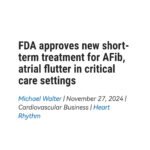New AI program delivers rapid, accurate echo video assessments Michael Walter| December 12, 2024 .
New AI program delivers rapid, accurate echo video assessments
Michael Walter| December 12, 2024 .
A new artificial intelligence (AI) program out of Yale University has displayed early potential to quickly and accurately evaluate echocardiogram videos, providing care teams with a detailed report that even includes helpful predictions.
The program, PanEcho, is a product of the Cardiovascular Data Science (CarDS) Lab at the Yale School of Medicine. It was developed using more than 1.2 million videos with multiple views based on approximately 34,000 transthoracic echocardiography tests from a large health system. The average age of patients included in the cohort was 67 years old, and approximately 52% of the patients were men.
Researchers presented initial data on PanEcho at the American Heart Association’s Scientific Sessions 2024 conference in Chicago.
“PanEcho has the potential to be used in simplified, AI-assisted screening echocardiograms”
“In settings where expert readers may not be readily accessible, PanEcho could rapidly rule out abnormalities that would otherwise require urgent referral.
Overall, it was found that using PanEcho was appropriate for detecting increased size in the left ventricle, systolic dysfunction in the left ventricle, left ventricle hypertrophy. In addition, it achieved excellent accuracy for detecting severe aortic stenosis, mitral stenosis, moderate or greater aortic regurgitation and moderate or greater mitral regurgitation.
PanEcho was also able to estimate left ventricle ejection fraction, estimate left ventricle intraventricular septum thickness and estimate left ventricle posterior wall thickness with a mean absolute error of 1.2 mm.
“This work represents an advance in AI for echocardiography, and we hope that the public release of our AI model will encourage the research community to move toward flexible, multi-task, multi-view approaches for echocardiogram interpretation”
The authors did note that additional research is still needed. PanEcho needs to be evaluated in a real-world healthcare environment using new patient data, for example, and its potential to improve care in critical care settings remains unclear.
https://cardiovascularbusiness.us13.list-manage.com/track/click?



